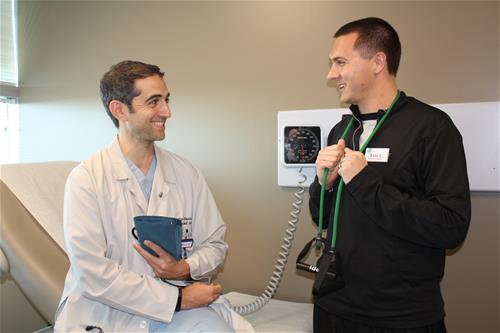by
Kristin Goddard | Dec 07, 2017
New guidelines recently lowered the range for what is considered high blood pressure (hypertension). Under these new standards, almost half of Americans will be diagnosed with hypertension. Under previous guidelines, 32 percent of the population had been classified as hypertensive.

Blood pressure higher than 130/80 is now considered hypertension, according to the American Heart Association and American College of Cardiology’s new joint guidelines. In addition to this change, the organizations recommend people with stage 1 hypertension try lifestyle changes—such as exercise and eating less salt and more fruit, vegetables and whole grains—before being prescribed medication.
"I believe these new guidelines are a positive change," said Luke Cutler, certified personal trainer at Galter LifeCenter, who believes that one of the biggest barriers to exercise and health lifestyle choices is motivation. "These new recommendations will better motivate people to make necessary exercise and lifestyle choices for their health."
Announcing these changes may also have a positive impact by raising awareness about maintaining healthy blood pressure levels. "Possibly an even bigger benefit to these new guidelines is the added awareness it brings to the situation," said Luke. "If people are more aware of their numbers, they can take steps toward improving their cardiovascular health through exercise and lifestyle choices, often avoiding the need for medical intervention."
Under the new standards, blood pressure of 120/80 or above is considered elevated, 130/80 to 139/89 is Stage 1 hypertension and anything 140/90 or above is stage 2 hypertension. If blood pressure reaches 180/120 or higher—and either number in the blood pressure reading counts—the situation is classified a hypertensive crisis, with immediate need for treatment or hospitalization.
"Lifestyle modification is often the initial and optimal treatment for high blood pressure," said Dr. Steve Attanasio, a interventional cardiologist with Swedish Covenant Medical Group. "High blood pressure can cause life-threatening conditions such as stroke, heart failure, heart attack, kidney disease and kidney failure, so it's important to know your numbers and have them checked regularly. If these new guidelines are followed properly it should enable more patients to avoid preventable conditions through proper blood pressure management."
Read answers to frequently asked questions about high blood pressure from experts at Swedish Covenant Hospital.